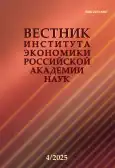International economic integration: a new level of a social contract?
- Authors: Belitskaya A.V.1, Yakovlev A.A.1,2
-
Affiliations:
- Lomonosov Moscow State University
- Institute of Economics of the RAS
- Issue: No 4 (2025)
- Pages: 150-166
- Section: World economy
- URL: https://journal-vniispk.ru/2073-6487/article/view/308911
- DOI: https://doi.org/10.52180/2073-6487_2025_4_150_166
- EDN: https://elibrary.ru/YWUDKR
- ID: 308911
Cite item
Full Text
Abstract
The purpose of this study is to identify the role of the social contract as a factor influencing the redistribution of resources within the framework of international economic integration, the effectiveness of creating a common market, solving the problems of ensuring the sustainability of economic growth, inequality and unemployment. In the course of the work, it was scientifically substantiated that the effectiveness of international economic integration depends on the presence of a social contract at the supranational level, supported by the possibility of distributing part of the rent not only by the state, but also directly by the integration association, as well as the possibility of creating supranational inclusive institutions within the framework of a common market of goods, capital and labor.
About the authors
Anna V. Belitskaya
Lomonosov Moscow State University
Email: belankav@gmail.com
ORCID iD: 0000-0002-6988-4022
Dr. Sci. (Law), Associate Professor, Professor of the Department of Entrepreneurial Law of the Faculty of Law
Russian Federation, MoscowArtem A. Yakovlev
Lomonosov Moscow State University; Institute of Economics of the RAS
Author for correspondence.
Email: ikovlevartem@yandex.ru
ORCID iD: 0009-0004-5579-4458
Cand. Sci. (Econ.), Associate Professor, Deputy Director of the Moscow School of Economics; Leading Researcher
Russian Federation, MoscowReferences
- Kheifets B.A. New model of international economic integration. M.: Institute of Economics of the RAS, 2023. (In Russ.)
- Shishkov Yu.V. Integration and disintegration: concept adjustment. World Economy and International Relations. 1993. No. 10. Pp. 50–68. (In Russ.). doi: 10.20542/0131-2227-1993-10-50-68.
- Aristotle. Politics / Ed. by A.I. Dovatur. Moscow: Publishing House “Yurait”, 2025. (In Russ.).
- List F. National system of political economy. Moscow; Chelyabinsk: Socium, 2017. (In Russ.).
- Engaged Societies, Responsive States: The Social Contract in Situations of Conflict and Fragility. Concept Note. April 2016. P.9. New York, 2016, https://www.undp.org/sites/g/files/zskgke326/files/publications/Social_Contract_in_Situations_of_Conflict_and_Fragility.pdf (accessed: 23.04.2025).
- Buchanan J., Tullock G. The Calculus of Consent: Logical Foundations of Constitutional Democracy. Ann Arbor, 1962.
- Myrdal G. World Economy: Problems and Prospects. Moscow, 1958. (In Russ.).
- Ushkalova D.I., Golovnin M.Yu. Theoretical Approaches to the Study of International Economic Integration. M.: Institute of Economics of the RAS, 2011. (In Russ.).
- Haas E.B. The Uniting of Europe: Political, Social, and Economic Forces. Stanford, Calif.: Stanford University Press, 1958.
- Milward A. The European Rescue of the Nation-State. London, 2000.
- Deutsch K. Political Community at the International Level: Problems of Definition and Measurement. Princeton, New Jersey, 1953.
- Habermas J. Involving the Other: Essays on Political Theory. Moscow: Nauka, 2008. (In Russ.).
- Political Economy of Russia: Dynamics of the Social Contract in the 2000s. Selected Works of the Institute of the National Project “Social Contract”, 2000–2009 / Compiled by A.A. Auzan, A.V. Zolotov, A.A. Stavinskaya, V.L. Tambovtsev. М., 2010. (In Russ.).
- Mitrany D. A Working Peace System. Chicago: Quadrangle Books, 1966.
- Genna G.M., Yang Z., Abdollahian M. Regional Integration and Economic Development: Optimal or Messy Networks? The Journal of Economic Integration. 2024. No. 39 (3). Pp. 557–589. https://doi.org/10.11130/jei.2024029 (accessed: 12.07.2025).
- Haas E.B., Schmitter P. Economics and Differential Patterns of Political Integration: Projections about Unity in Latin America // International Organization. 1964. Vol. 18. No. 4. P. 710.
- Turaeva M., Yakovlev A. History of the Global Climate Agenda and Its Future in the Eurasian Economic Union // ISTORIYA. 2024. Vol. 15. Iss. 6 (140). https://history.jes.su/s207987840031942-5-1/. (accessed: 12.07.2025). (In Russ.). doi: 10.18254/S207987840031942-5.
- Вutorina V.O. The Goals of Regional Integration: A Modern Understanding // World Economy and International Relations. 2021. Vol. 65. No. 10. Pp. 5–14. (In Russ.). doi: 10.20542/0131-2227-2021-65-10-5-14.
- Streeten P. Economic Integration, Aspects and Problems. Leyden: A.W. Sythoff, 1964.
- Butorina O.V., Borko Yu.A. Benefits of Regional Integration: Reconsidering the Concept // Modern Europe. 2022. No. 1 (108). Pp. 5–20. (In Russ.). doi: 10.31857/S0201708322010016.
- Ushkalova D.I. Models of Economic Integration and Their Typology // Bulletin of the Institute of Economics of the Russian Academy of Sciences. 2016. No. 3. Pp. 158–170. (In Russ.).
- Tinbergen J. International Economic Integration. Amsterdam: Elsevier, 1954.
- Nekipelov A.D. Search for social optimum: chasing a ghost? // Herald of the Russian Academy of Sciences. 2023. No. 93 (5). Pp. 415–427. (In Russ.). doi: 10.31857/S0869587323050080.
- Polterovich V.M. Collaborative hierarchies // Voprosy Ekonomiki. 2021. No. 7. Pp. 31–48. (In Russ.). doi: 10.32609/0042-8736-2021-7-31-48.
- Rodrik D. How Far Will International Economic Integration Go? // Journal of Economic Perspectives. Vol. 14. No. 1. 2000. Pp. 177–186.
Supplementary files







